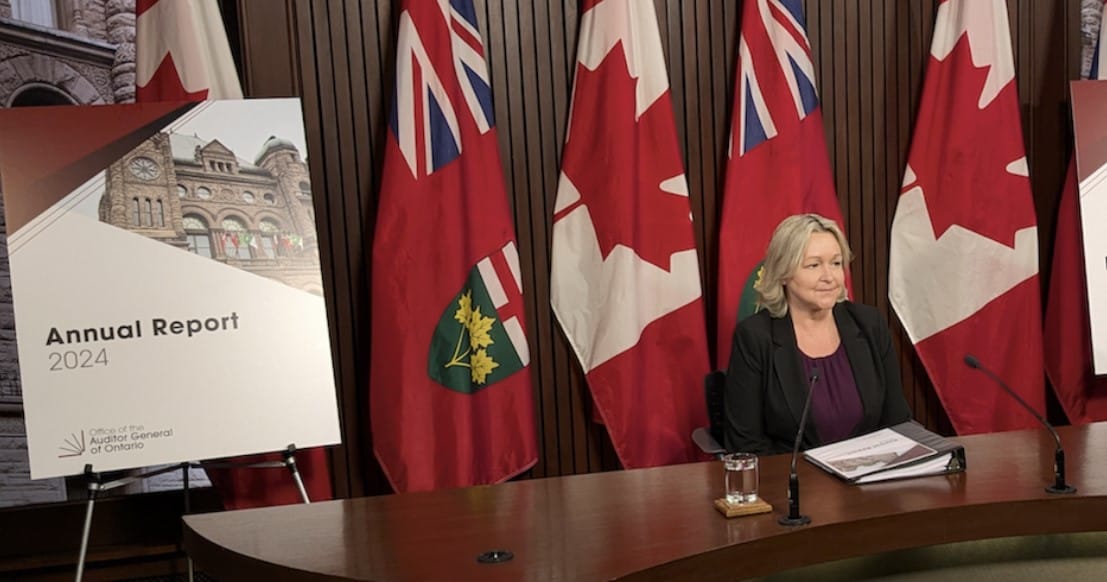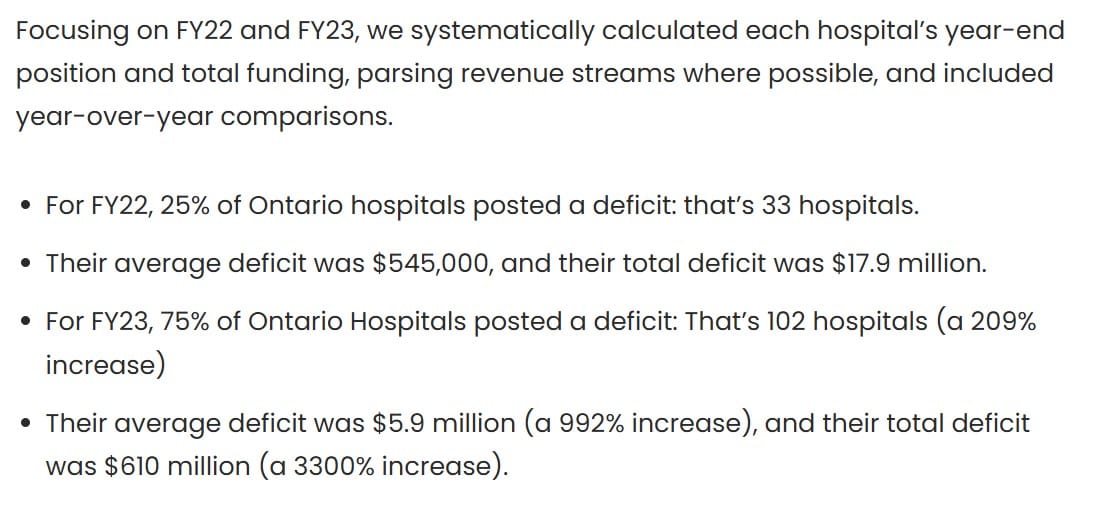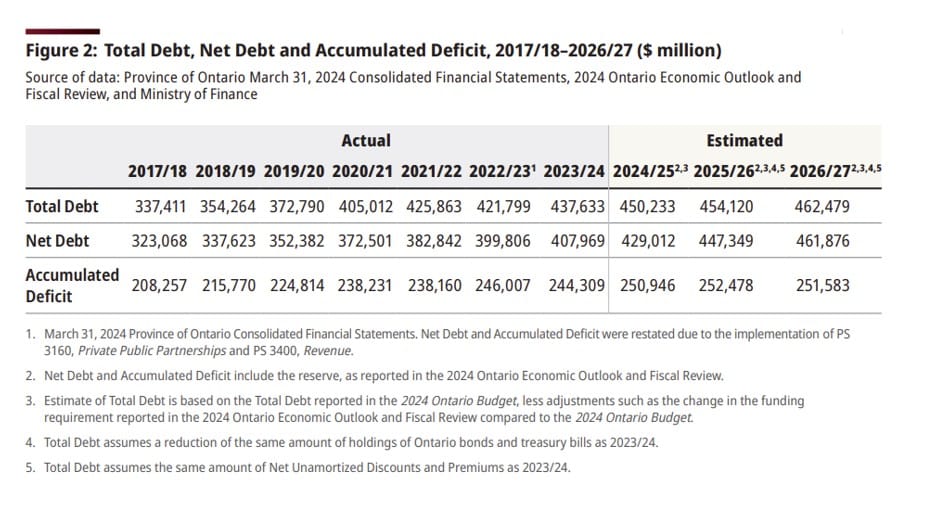What the AG's report tells us about Ford's Bust Out

Dear readers and subscribers, hello again. It’s been quite awhile.
We never intended to be away from the newsletter this long, or away at all, really. Those of you who have followed us for awhile know Corruptario is a passion project. For the last few months, family and work issues have had us burning our candle at both ends, and in the middle too. We were treading water.
Thank you for sticking with us, especially our beloved paid subscribers. We’re back, and there’s no end of corruption to write about, so hopefully we can pick up the pace.
Now, let’s catch up…
Ontario’s Auditor General, Shelley Spence, released her 2024 audits this week, and we looked at the first report of the series, titled “The Public Accounts of the Province of Ontario.”
Readers who follow us on social media may have seen our writing about Ford’s “bust out”, and the AG report includes a number of critiques which support that thesis.
For the unfamiliar, a “bust out” is a classic mafia tactic that has been adopted by private equity in recent years. Fans of The Sopranos will recognize the move – take over a company to get inside, run up its debt, cut off its revenue streams, sell off its assets. Once all the cash and capital has been squeezed out, you leave it for dead.
In the case of Ontario, Team Ford has been running a bust out since their installment in 2018. The twist, when bankrupting a province vs. a business, is that a bankrupt province provides even more opportunities for profiteers (particularly our oligarchs, and party faithful) to take over what remains of public services in Ontario, including healthcare and education.
If you believe plundering and then bankrupting Ontario is Team Ford’s goal, the AG report contains details and criticisms to support that belief.
Anyone interacting with healthcare in Ontario over the past few years will tell you the system is barely hanging on. In addition to the passing of Bill 124, which was intended to enrich private healthcare staffing agencies while undermining public healthcare, the hospital system is being strategically starved of funding by the Ford government. As Minden Paper outlined in its testimony before Ontario’s Standing Committee on Bill 180, the majority of Ontario hospitals are now in deficit.

The AG report notes that the Ministry of Health did not complete its year-end (March 31, 2024) reconciliations for over $65.3B allocated. Indeed, for many service providers (meaning hospitals and other healthcare institutions) the Ministry is behind on its reconciliations for five fiscal years.
“We found that there were a significant number of outstanding reconciliations that date back up to five years for many transfer program areas as of the end of July 2024.”
As part of transfer payment agreements, service providers (in this case, hospitals) are required to submit annual reports that are used to reconcile amounts the Ministry paid out to the amounts the providers spent on program delivery. The AG doesn’t mention if, or whether, service providers have still been providing the Ministry with their annual financial reports.
Taken all together (call it a lack of transparency, or a willful attempt to obscure its own malfeasance), the AG’s commentary indicates that her office cannot get a clear picture on health transfer payments in Ontario, which should concern us all.
As is typical of the Auditor General, the 2024 report continues to comment on Ontario’s rapidly growing debt burden. This report noted that the Province incurred additional debt of $15.8B (3.8%) in 2023/24 compared to the previous year.
As shown in a chart from the report, debt is projected to grow, reaching $462B by 2026/27. Despite the fact that Team Ford ran on a campaign to eliminate the deficit, there is virtually no change to projected deficits between now and 2027.
“When deficits are sustained over time, the government will need to borrow more money to finance its operations, which increases the net debt.”

While the AG’s office tends to use neutral language and largely relies on the data to tell the tale, it went out of its way to contextualize Ontario’s debt for readers.
“To put this in perspective, the amount of debt owed by each resident of Ontario on behalf of the government will increase from about $20,439 per person at the beginning of 2014/15 to about $27,873 per person in 2026/27… In other words, it would cost every Ontarian $27,873 to eliminate the province’s net debt in 2026/27.”
To press the point again, the report also notes that 6.3 cents of every dollar in government revenue will go toward paying interest on debt by 2026/27.
On the same issue of high debt, the AG is required to report annually on government’s compliance with the Fiscal Sustainability Transparency and Accountability Act, 2019. In the most recent report, the AG states that the government “is not fully in compliance” with the requirement to develop a “debt burden reduction strategy,” including setting out net-debt-to-GDP objectives and provide a progress report on the supporting actions and implementation of the strategy.
The same Act also requires that the Executive Council “shall plan for a balanced budget.” Again, according to the AG, that requirement has not been met.
The AG’s report does not paint a picture of a government concerned by Ontario’s growing debt. In fact, it indicates a government which is purposefully growing the province’s level of indebtedness.
By running deficits alone, Ford has ensured that the province has less and less money for education, healthcare and social programs each year, as more of the tax revenue gets spent on interest.
As we know, Team Ford has also, in parallel, been ending streams of revenue into the provincial coffers, such as license plate renewal fees, and revenues from booze sales.
Corruptario is a reader-supported publication. To receive new posts and support our work, consider becoming a free or paid subscriber. If you find this work valuable, you can leave us a tip!
